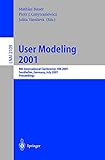User Modeling 2001 [electronic resource] : 8th International Conference, UM 2001 Sonthofen, Germany, July 13–17, 2001 Proceedings / edited by Mathias Bauer, Piotr J. Gmytrasiewicz, Julita Vassileva.
Material type: TextSeries: Lecture Notes in Computer Science ; 2109Publisher: Berlin, Heidelberg : Springer Berlin Heidelberg, 2001Description: XIV, 326 p. online resourceContent type:
TextSeries: Lecture Notes in Computer Science ; 2109Publisher: Berlin, Heidelberg : Springer Berlin Heidelberg, 2001Description: XIV, 326 p. online resourceContent type: - text
- computer
- online resource
- 9783540445661
- 005.437 23
- 4.019 23
- QA76.9.U83
- QA76.9.H85
 E-BOOKS
E-BOOKS
| Home library | Call number | Materials specified | URL | Status | Date due | Barcode | |
|---|---|---|---|---|---|---|---|
| IMSc Library | Link to resource | Available | EBK4895 |
Full Papers -- Harnessing Models of Users’ Goals to Mediate Clarification Dialog in Spoken Language Systems -- Modeling the Acquisition of English: An Intelligent CALL Approach ? -- Recognizing Time Pressure and Cognitive Load on the Basis of Speech: An Experimental Study -- The Learning Shell: Automated Macro Construction -- Learning Interaction Models in a Digital Library Service -- A User Modeling Approach to Determining System Initiative in Mixed-Initiative AI Systems -- Collaborating with Focused and Unfocused Users under Imperfect Communication -- Improving User Modelling with Content-Based Techniques -- An Integrated Approach for Generating Arguments and Rebuttals and Understanding Rejoinders -- Acquiring User Preferences for Product Customization -- Utility-Based Decision Tree Optimization: A Framework for Adaptive Interviewing -- User Modelling in I-Help: What, Why, When and How -- An Adaptive User-Interface-Agent Modeling Communication Availability -- Cognitive Computer Tutors: Solving the Two-Sigma Problem -- Applying Interactive Open Learner Models to Learning Technical Terminology -- Student and Instructor Models: Two Kinds of User Model and Their Interaction in an ITS Authoring Tool -- METIORE: A Personalized Information Retrieval System -- Personalizing Delivered Information in a Software Reuse Environment -- Automating Personal Categorization Using Artificial Neural Networks -- Posters -- User Modelling as an Aid for Human Web Assistants -- Modelling the Interests of a News Service User -- Category Based Customization Approach for Information Retrieval -- Using Rollouts to Induce a Policy from a User Model -- Tailoring the Content of Dynamically Generated Explanations -- A User Model Based on Content Analysis for the Intelligent Personalization of a News Service -- Modeling Exploratory Behaviour -- Ascribing and Weighting Beliefs in Deceptive Information Exchanges -- Visual Search and Background Complexity: Does the Forest Hide the Trees? -- Characterizing Sequences of User Actions for Access Logs Analysis -- Modeling Literary Style for Semi-automatic Generation of Poetry -- Perceptual Considerations for Quality of Service Management: An Integrated Architecture -- Emotions and Personality in Agent Design and Modeling -- Using Document Structures for Personal Ontologies and User Modeling* -- User-Tailored Plan Presentation -- Investigating Students’ Self-Assessment Skills -- Generating Personal Travel Guides - And Who Wants Them? -- Inspectability and User Controlled Revision on Long Term User Models -- Getting the Right Information to the Right Person -- Goals, Tasks and Application Domains as the Guidelines for Defining a Framework for User Modelling -- Doctoral Consortium -- Improving Student Models by Reasoning about Cognitive Ability, Emotions and Gender -- Integrating Multilingual Text Classification Tasks and User Modeling in Personalized Newspaper Services -- Enhancing Embodied Intelligent Agents with Affective User Modelling -- Designing TV Viewer Stereotypes for an Electronic Program Guide -- AGENDA CULTUREL An Adaptive Cultural Information Service -- Ubiquitous User Modeling for Situated Interaction -- An Intelligent Pedagogical Agent in CALL -- How to Learn More about Users from Implicit Observations1 -- Student Modelling for CALL Based on Pedagogical Standards -- Evaluation of Adaptive Systems -- Supporting Negotiated Assessment Using Open Student Models -- Using Markov Chains for Structural Link Prediction in Adaptive Web Sites -- Invited Talks -- Tailoring Privacy to Users’ Needs 1 -- Heavyweight Applications of Lightweight User Models: A Look at Collaborative Filtering, Recommender Systems, and Real-Time Personalization -- Eye Tracking: A Rich Source of Information for User Modeling.
There are no comments on this title.

